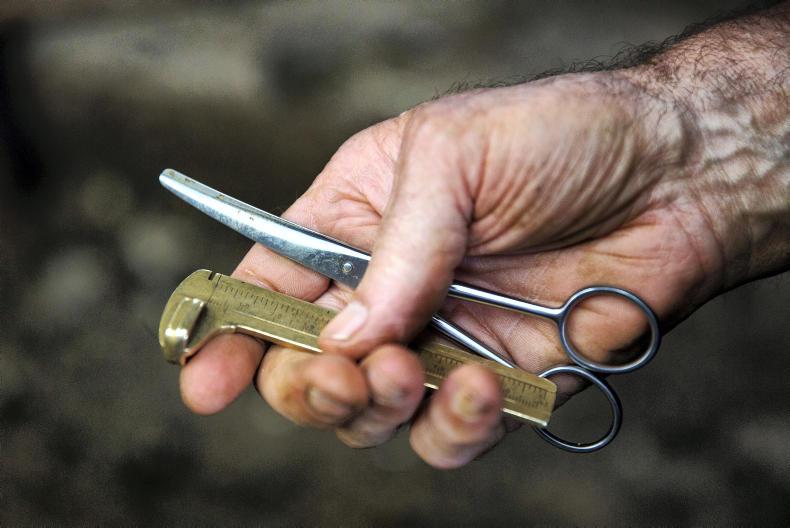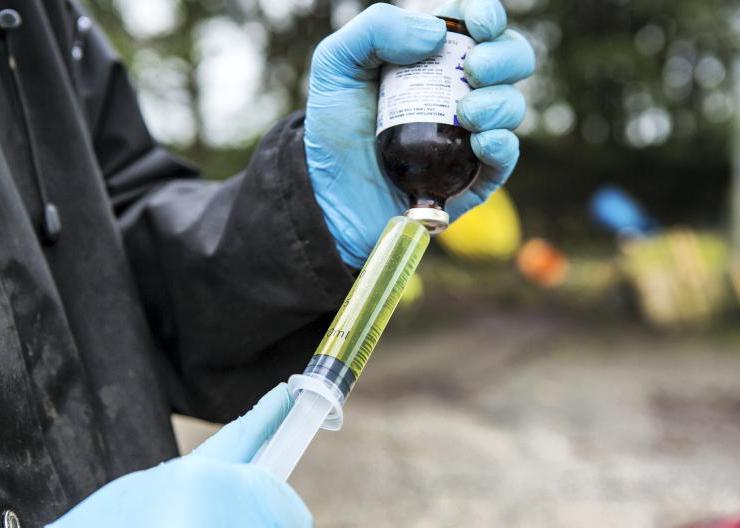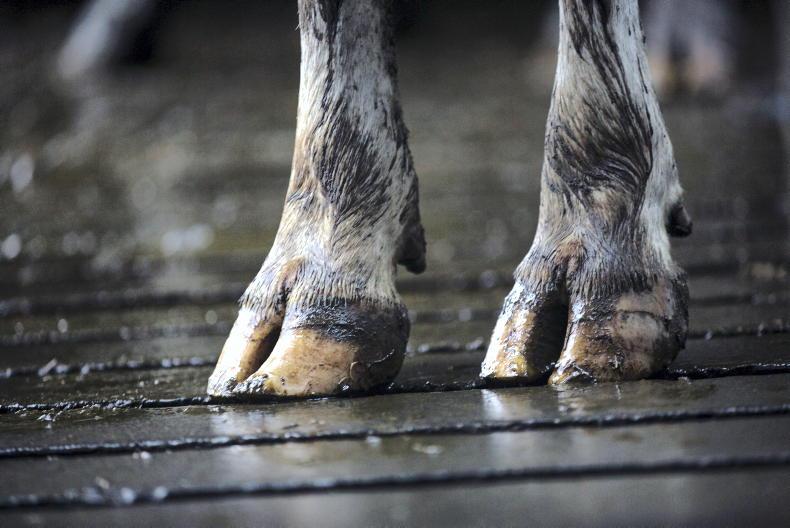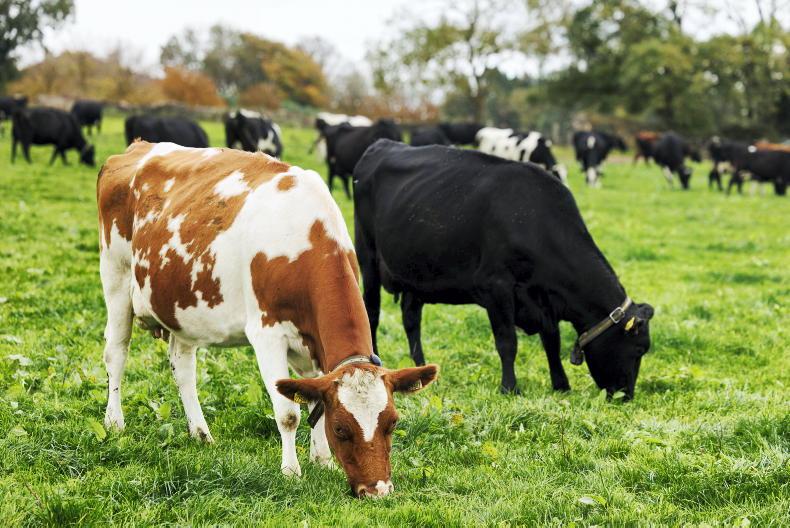Calves between 42 and 120 days of age can be tested for TB where both the farmer and vet are satisfied social distancing can be adhered to, the Department of Agriculture has said.
In March, the Department extended the age of the exemption for testing calves from 42 to 120 days.
However, now “if calves under 120 days are not tested, they will be eligible for movement once the herd retains its free status, until they reach 120 days of age,” the Department has said.
“This exemption does not apply to reactor retests, nor to the requirements for TB testing for export. Where a calf aged under 120 days is intended for export, the requirement for a 30-day pre-export TB test remains in place for calves [greater than] 42 days of age.
“Calves aged over 120 days must have passed a TB test in order to move out of the herd. If a calf was not tested during a herd test due to being aged 42 to 120 days, when it goes above 120 days a private TB test will be required to enable it to move.
“This age exemption will apply until 1 June 2020, at which point it will be reviewed.”
COVID-19 symptoms and cocooning
If a farmer is not available to present his or her cattle for TB testing as he or she is self-isolating due to symptoms of COVID-19 or is cocooning, then the farmer should follow HSE advice and not present the cattle for testing himself or herself, the Department has said.
“If possible, alternative arrangements should be made so that someone else can assist with the TB test on his or her behalf. If this is not possible, the RVO should be informed and the test can be delayed.
“The herd will have its trading status suspended due to being out of test. This suspension will be applied after a 28-day grace period, during which the herd can continue to trade. When the suspension is then applied, moves directly to slaughter will still be permitted.”
Vet issues
If a vet is scheduled to carry out a TB test but becomes unavailable due to COVID-19-related issues, such as self-isolation, cocooning or critical staff shortages within the practice, the vet should inform the farmer and the RVO at the earliest opportunity and try to arrange for an alternative vet from the practice to carry out the test.
The Department has said if this is not possible, the RVO, in consultation with the original vet, may contact a vet from another practice to carry out the test.
“If these alternative arrangements are not possible, the test can be delayed. The herd will have its trading status suspended due to being out of test.
"This suspension will be applied after a 28-day grace period, during which the herd can continue to trade. When the suspension is then applied, moves directly to slaughter will still be permitted,” the Department said.
Cross-compliance action
If a TB test is delayed due to COVID-19-related issues, the delay in testing will not be a basis for referring the farmer for possible cross-compliance action, the Department has said.
“If the delayed test is a DAFM-paid test, a delay due to COVID-19 will not be grounds to make it a farmer-paid test.”
Untested cattle
If it is not possible to test every animal while observing the appropriate social distance, the Department is advising farmers and vets the following:
The vet should submit the test report with untested animals accompanied by note “unable to restrain”.Where any untested animals are aged over 120 days, the RVO will suspend the herd and list a miscellaneous animal test to the testing vet/practice.If the only untested animals are under 120 days, the herd will not be suspended.The vet can make arrangements to test the remaining cattle when adequate restraint to allow social distancing has been provided – this may involve use of a pen with a restraining head gate. Such arrangements may be made for calves under 120 days of age in reactor herds.
IFA animal health chair Pat Farrell said the revised TB testing protocol issued by the Department is a practical amendment to the programme, taking into account the current COVID-19 advice.
The IFA said it had constructive discussions with the Department of Agriculture last week on the issue and the changes announced on Monday provide clarity for farmers and vets on two key areas: the testing of calves under 120 days and for people over 70 involved in TB testing.
Farrell said those farmers who want to test calves under 120 days in their herd are allowed.
This is of major benefit to farmers who want to sell these animals later in the year and avoids the need at that time to have costly private tests carried out on small numbers of animals, according to the IFA.
Read more
New TB testing concessions agreed due to COVID-19
Watch: Purcell Brothers loading bulls for Libya
Calves between 42 and 120 days of age can be tested for TB where both the farmer and vet are satisfied social distancing can be adhered to, the Department of Agriculture has said.
In March, the Department extended the age of the exemption for testing calves from 42 to 120 days.
However, now “if calves under 120 days are not tested, they will be eligible for movement once the herd retains its free status, until they reach 120 days of age,” the Department has said.
“This exemption does not apply to reactor retests, nor to the requirements for TB testing for export. Where a calf aged under 120 days is intended for export, the requirement for a 30-day pre-export TB test remains in place for calves [greater than] 42 days of age.
“Calves aged over 120 days must have passed a TB test in order to move out of the herd. If a calf was not tested during a herd test due to being aged 42 to 120 days, when it goes above 120 days a private TB test will be required to enable it to move.
“This age exemption will apply until 1 June 2020, at which point it will be reviewed.”
COVID-19 symptoms and cocooning
If a farmer is not available to present his or her cattle for TB testing as he or she is self-isolating due to symptoms of COVID-19 or is cocooning, then the farmer should follow HSE advice and not present the cattle for testing himself or herself, the Department has said.
“If possible, alternative arrangements should be made so that someone else can assist with the TB test on his or her behalf. If this is not possible, the RVO should be informed and the test can be delayed.
“The herd will have its trading status suspended due to being out of test. This suspension will be applied after a 28-day grace period, during which the herd can continue to trade. When the suspension is then applied, moves directly to slaughter will still be permitted.”
Vet issues
If a vet is scheduled to carry out a TB test but becomes unavailable due to COVID-19-related issues, such as self-isolation, cocooning or critical staff shortages within the practice, the vet should inform the farmer and the RVO at the earliest opportunity and try to arrange for an alternative vet from the practice to carry out the test.
The Department has said if this is not possible, the RVO, in consultation with the original vet, may contact a vet from another practice to carry out the test.
“If these alternative arrangements are not possible, the test can be delayed. The herd will have its trading status suspended due to being out of test.
"This suspension will be applied after a 28-day grace period, during which the herd can continue to trade. When the suspension is then applied, moves directly to slaughter will still be permitted,” the Department said.
Cross-compliance action
If a TB test is delayed due to COVID-19-related issues, the delay in testing will not be a basis for referring the farmer for possible cross-compliance action, the Department has said.
“If the delayed test is a DAFM-paid test, a delay due to COVID-19 will not be grounds to make it a farmer-paid test.”
Untested cattle
If it is not possible to test every animal while observing the appropriate social distance, the Department is advising farmers and vets the following:
The vet should submit the test report with untested animals accompanied by note “unable to restrain”.Where any untested animals are aged over 120 days, the RVO will suspend the herd and list a miscellaneous animal test to the testing vet/practice.If the only untested animals are under 120 days, the herd will not be suspended.The vet can make arrangements to test the remaining cattle when adequate restraint to allow social distancing has been provided – this may involve use of a pen with a restraining head gate. Such arrangements may be made for calves under 120 days of age in reactor herds.
IFA animal health chair Pat Farrell said the revised TB testing protocol issued by the Department is a practical amendment to the programme, taking into account the current COVID-19 advice.
The IFA said it had constructive discussions with the Department of Agriculture last week on the issue and the changes announced on Monday provide clarity for farmers and vets on two key areas: the testing of calves under 120 days and for people over 70 involved in TB testing.
Farrell said those farmers who want to test calves under 120 days in their herd are allowed.
This is of major benefit to farmers who want to sell these animals later in the year and avoids the need at that time to have costly private tests carried out on small numbers of animals, according to the IFA.
Read more
New TB testing concessions agreed due to COVID-19
Watch: Purcell Brothers loading bulls for Libya










SHARING OPTIONS